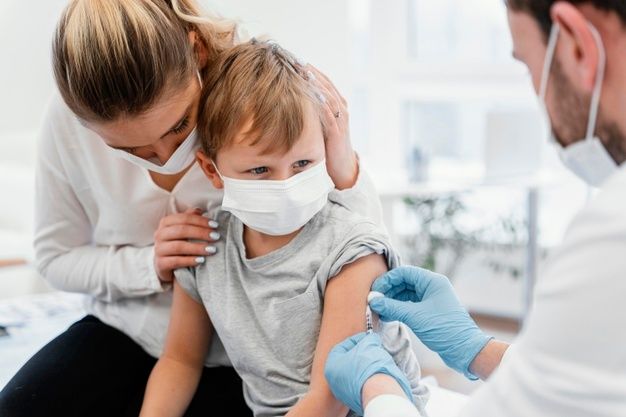
COVID-19 Vaccines Are Now Available for Kids Under 5—Which One Should You Choose?
For parents and caregivers of children under the age of 5, the wait is finally over. As of June 17, 2022, two COVID-19 vaccines have been given Emergency Use Authorization (EUA) status by the U.S. Food and Drug Administration (FDA). The paths to obtaining EUA were slightly different for each of the two vaccines—Moderna & Pfizer-BioNTech—and each series does have slight differences.
Here’s what you need to know about how the FDA approved COVID-19 vaccines for EUA in children younger than 5, the differences between the two choices, the safety profiles of both options, and how to prepare for giving a COVID vaccine to a young child.
Authorizing the Moderna COVID-19 Vaccine in Young Children
Before the FDA decided to authorize the Moderna mRNA vaccine in children ages 6 months to 17 years, it had only been available for people ages 18 and older. The FDA’s recent decision was guided by data evaluated during two “ongoing, randomized, blinded, placebo-controlled clinical trials in the United States and Canada,” both of which included infants through adolescents. These subjects were given two 25 microgram doses of the vaccine (a quarter of the dose given to adults) and then analyzed during a period when the omicron variant was circulating widely. The vaccine was found to be effective at preventing COVID-19 in 50.6% of children ages 6 through 23 months and 36.8% effective in children 2 through 5 years old.
Safety of the Moderna COVID-19 Vaccine in Young Children
Based on the clinical trial data, the Moderna vaccine appears to be safe in children under the age of 5 years. The most common side effects reported were swelling or redness at the area of injection, fever, and swelling or tenderness of lymph nodes in the underarm or groin. Younger children (6 months to 36 months) were more likely to have irritability, crying, sleepiness, and appetite loss. Some 37-month to 5-year-old children also experienced fatigue, headaches, muscle aches, chills, nausea or vomiting, and joint stiffness.
Authorizing the Pfizer-BioNTech COVID-19 Vaccine in Young Children
Before the FDA gave EUA approval to the Pfizer-BioNTech vaccine for young children, it was available for children ages five and older. The FDA’s recent decision to modify its authorization was guided by data from an “ongoing, randomized, blinded, placebo-controlled clinical trial in the United States and internationally,” which included infants and children. Among the subgroups ages 6 months to 23 months and 2 years to 4 years, researchers analyzed the immune response to the vaccine and found it was comparable to the immune response in older trial participants. Children were given three microgram doses of the vaccine (one-tenth the dose given to adults), and it was found to be effective at preventing COVID-19 in 80.3% of cases. However, this study was conducted before the omicron variant was the dominant variant, and the effectiveness estimate was made using only 10 COVID-19 cases that occurred after the two-dose series was deemed ineffective, and a third dose was added during the trial.
Safety of the Pfizer-BioNTech COVID-19 Vaccine in Young Children
The clinical trial data available to the FDA, which informed its authorization of the Pfizer-BioNTech vaccine, showed that younger children (6 months to 23 months) were more likely to be irritable after receiving the vaccine and also to have low appetite, fever, pain, redness and swelling in the area of the injection. Older children, ages 2 to 4 years, also experienced headaches, chills, and fevers, in addition to these other symptoms.
Choosing Between Pfizer-BioNTech and Moderna Vaccines
While COVID vaccines for the five and under age group aren’t as effective at preventing COVID-19 illness as in adults, they are still an important tool in keeping your child healthy and preventing long-term health problems. Both vaccines have demonstrated a robust safety profile, so, from a public health standpoint, you can’t lose with either. Instead, the choice of vaccines may hinge on a few factors, and each family will have its own calculus. Ultimately, it helps to ask a few questions when preparing to get your children vaccinated:
How many shots do you want your child to get? Moderna requires two for an immunocompetent child, whereas Pfizer-BioNTech requires three. This consideration may be important for parents with busy schedules or who cannot easily take a child to the doctor’s office.
How much do you care about the potential for side effects? Because the Pfizer vaccine is a smaller amount of vaccine each time, it may be more tolerable for children than the Moderna vaccine—meaning that there may be fewer side effects such as fever.
How much do you care about the speed of vaccine protection? If you want to get your child up to speed with vaccination fast, you may prefer Moderna. The Pfizer series stretches out over a longer period (11 weeks compared to 4 weeks), and children will not be fully protected until after they receive their final dose.
For more information about COVID vaccines in young children, visit the CDC’s site.
References
[1] Coronavirus (COVID-19) Update: FDA Authorizes Moderna and Pfizer-BioNTech COVID-19 Vaccines for Children Down to 6 Months of Age. https://www.fda.gov/news-events/press-announcements/coronavirus-covid-19-update-fda-authorizes-moderna-and-pfizer-biontech-covid-19-vaccines-children?utmsource=newsletter4035&utmmedium=email&utmcampaign=nphic-news-highlights
[2] COVID-19 Vaccines for Kids Under 5: What Parents Need To Know. https://www.yalemedicine.org/news/covid-19-vaccines-kids-under-5
[3] Comparing the Pfizer and Moderna Covid vaccines for young children. https://www.statnews.com/2022/06/20/comparing-the-pfizer-and-moderna-covid-vaccines-for-young-children/

